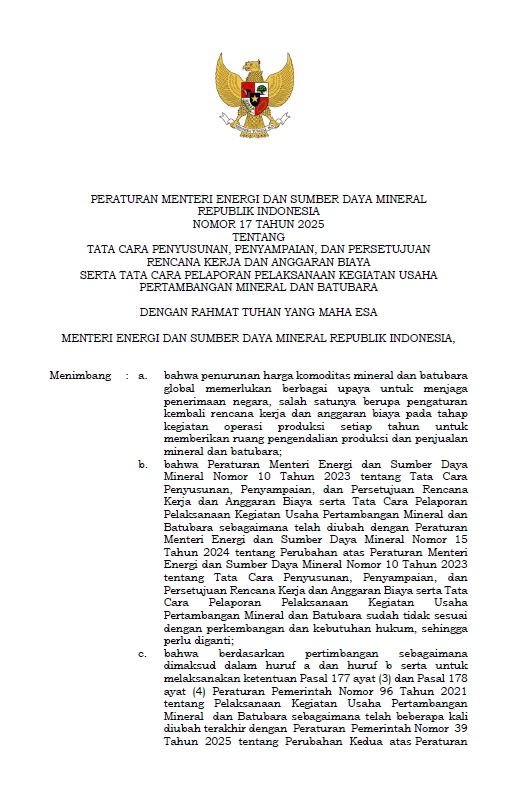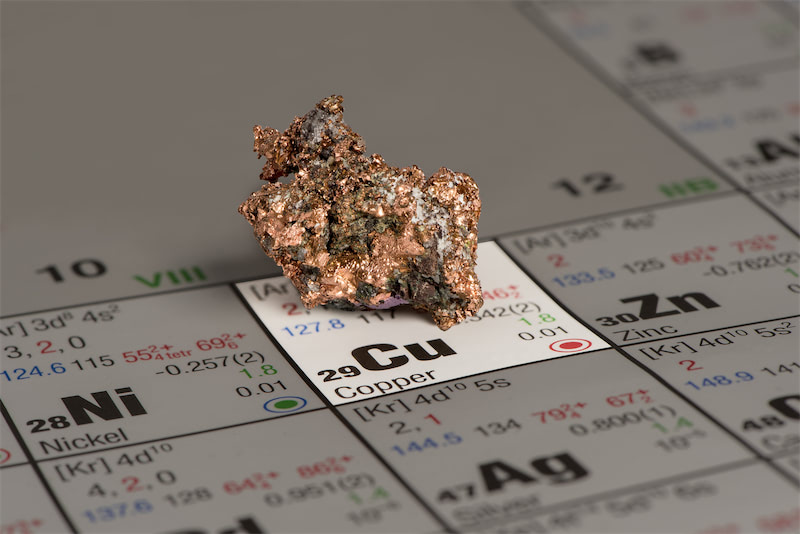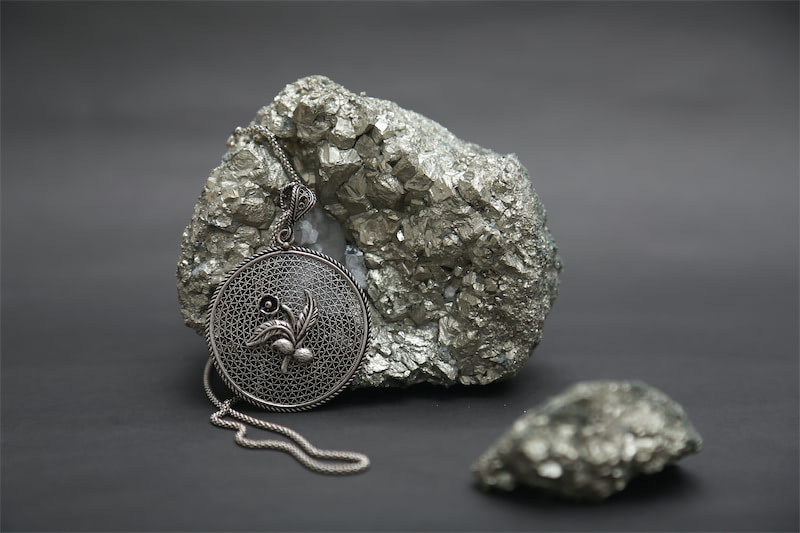I. Background and Core Changes of the Regulatory Adjustment
On October 3, 2025, the Ministry of Energy and Mineral Resources of Indonesia issued the "Ministerial Regulation No. 17 of 2025", titled "Procedures for the Preparation, Submission, Approval, and Reporting of Work Plans and Budgets for Mineral and Coal Mining Activities in 2026". The core change is: adjusting the original three-year RKAB approval system back to an annual system, effective from 2026. Production quotas for 2026 that some mining licenses (IUP) obtained in 2024 and 2025 were declared invalid, and enterprises need to resubmit new annual RKABs. This adjustment aims to address the fiscal revenue pressure brought by the decline in mineral and coal commodity prices, serving as a key measure to safeguard national fiscal income.
II. Overview of the Latest RKAB System
(1) Submission Process and Time Nodes
1. General Provisions: All mining license holders, regardless of whether they are in the exploration or production phase, must submit an RKAB annually as a guiding document for the following year's mining and production activities.
2. Submission Times:
- If the IUP/IUPK is newly issued or renewed, the RKAB should be submitted within 30 days after issuance;
- The regular annual submission period is from October 1 to November 15 each year, for the approval of the next year;
- If the IUP/IUPK is issued after November 15, it must be submitted by the end of the current year;
- All submissions must be completed through the official RKAB online information system.

(2) Required Documents
- Exploration Phase Enterprises Must Provide: Actual and planned exploration maps (electronic version), reclamation deposit payment proof, and relevant materials from the Chief Technical Officer of Mining (KTT).
- Production Operation Phase Enterprises Must Provide: Administrative documents, resource/reserve estimation reports issued by qualified personnel, non-tax revenue payment vouchers, electronic maps (including mining areas, stripping plans, forest land, etc.), reclamation deposit payment proof (to be paid one year in advance), and the mining area must not exceed the scope of the feasibility study and environmental permits.
(3) Approval Time Limits
The minister or governor must complete the initial review (approval or request for revision) within 5 working days; the enterprise must make corrections within 2 working days, with a maximum of three revisions allowed. Even if approved, the enterprise still needs to obtain additional permits such as forest land use, land ownership documents, and marine utilization permits (if applicable).
(4) RKAB Revision Mechanism
IUP or IUPK enterprises (whether in the exploration or production phase, including contract/ agreement continuation projects) can only submit one RKAB revision application per year. The application must be submitted after the Q2 regular report or no later than July 31 of the same year.
III. SMM Analysis: Multiple Policies Drive the Indonesian Tin Industry: PT Timah Expands Capacity and Strengthens Resource Control Simultaneously
PT Timah, an Indonesian state-owned tin miner (a subsidiary of the state-owned mining holding company MIND ID), announced that starting from 2026, it will operate five confiscated tin smelters in Bangka Belitung, including PT Refined Bangka Tin (RBT), PT Sariwiguna Bina Sentosa (SBS), PT Stanindo Inti Perkasa (SIP), PT Tinindo Inter Nusa (TIN), and CV Venus Inti Perkasa (VIP). These smelters were previously seized by the prosecutor's office due to alleged tin trade corruption, with the related assets valued at approximately 600 million to 700 million rupiah. Currently, PT Timah is inspecting the condition of the smelters, and a technical assessment will be conducted this week, with plans to start refined tin ingot production early in 2026. The company has also stockpiled ore in advance to ensure supply. The Indonesian government has also tasked PT Timah with strengthening control over the tin industry, curbing illegal mining, and ensuring national tin export revenues.
In terms of capacity planning, PT Timah's RKAB (coal and mineral work plan) has clear objectives: aiming to produce 22,000 mt of tin in 2025, increasing the target to 30,000 mt in 2026, and further expanding to 80,000 mt in the future. This capacity expansion aligns with the operational plans for the five confiscated smelters.
This capacity layout is highly consistent with the policy direction of the Indonesian tin industry. As early as February 18, 2025, the Indonesian parliament passed amendments to the mining law, clearly prioritizing mining concessions for companies building processing facilities, with the evaluation focusing on investment scale, value-added potential, and employment contributions, paving the way for the development of the downstream tin processing industry and promoting the aggregation of resources towards high-efficiency capacities. Now, this policy is further implemented through the latest RKAB regulations — while addressing the decline in mineral prices and securing fiscal revenue, the new rules enhance the precision of resource allocation: compliant tin mining enterprises with downstream processing layouts will receive priority in RKAB approvals, while inefficient and illegal enterprises will face strict restrictions on RKAB approvals.
Meanwhile, Indonesia continues to intensify its crackdown on illegal mining. At the handover ceremony of the five smelters, Indonesian President Prabowo Subianto pointed out that about 80% of annual tin production is smuggled, and illegal mining has caused losses of around 3 trillion rupiah to the country, calling for law enforcement officials to step up efforts. Similar actions will be carried out in other regions, and it is expected that by the end of this year, efforts to eliminate illegal mining could save up to 2.2 billion rupiah for the country. On September 30, Indonesian Army Chief of Staff General Richard Tampubolon inspected an illegal tin mining site in Bangka Belitung, which was sealed off by the special task force controlling the forested area. The involved PT Trinindo Internusa smelter will be handed over to the government.
As the main tin-producing region in Indonesia, Bangka Belitung holds 91% of the country's tin reserves and about 95% of rare earth metal reserves, with tin and rare earth elements being crucial to modern industries. In the future, the operation of the five confiscated smelters, managed in collaboration with local communities, is expected to further support the government's plan to strengthen downstream processing in the tin industry, create high-value-added products, and drive the Indonesian tin industry towards compliance and efficiency.
Focusing on the core issues of the Indonesian tin industry: How will the supply landscape evolve? What are the characteristics of the current demand situation? Where will the export trends head? From October 22-24, 2025, the 15th SMM Tin Industry Chain Conference will kick off in Gejiu, with the business development director of the Indonesian state-owned enterprise PT Timah attending to share industry insights. We look forward to the participation of tin industry practitioners for exchanges and to promote industrial development.

![The Most-Traded SHFE Tin Contract Opened Lower and Then Traded Stronger, Spot Market Recovers Amid Downtrend [SMM Tin Midday Review]](https://imgqn.smm.cn/usercenter/WWXJU20251217171753.jpg)
![The most-traded SHFE tin contract fluctuated rangebound during the night session, with downstream enterprises mostly following up with small-lot transactions. [SMM Tin Morning Brief]](https://imgqn.smm.cn/usercenter/bYFQn20251217171752.jpg)
